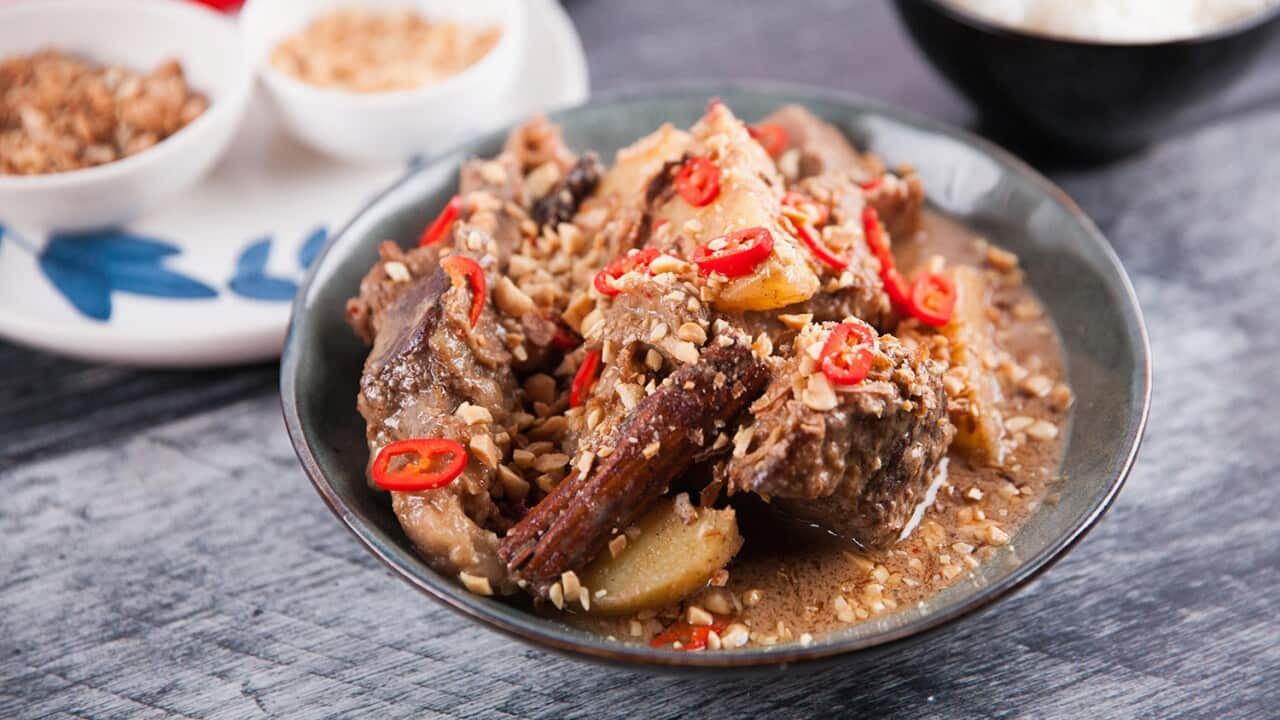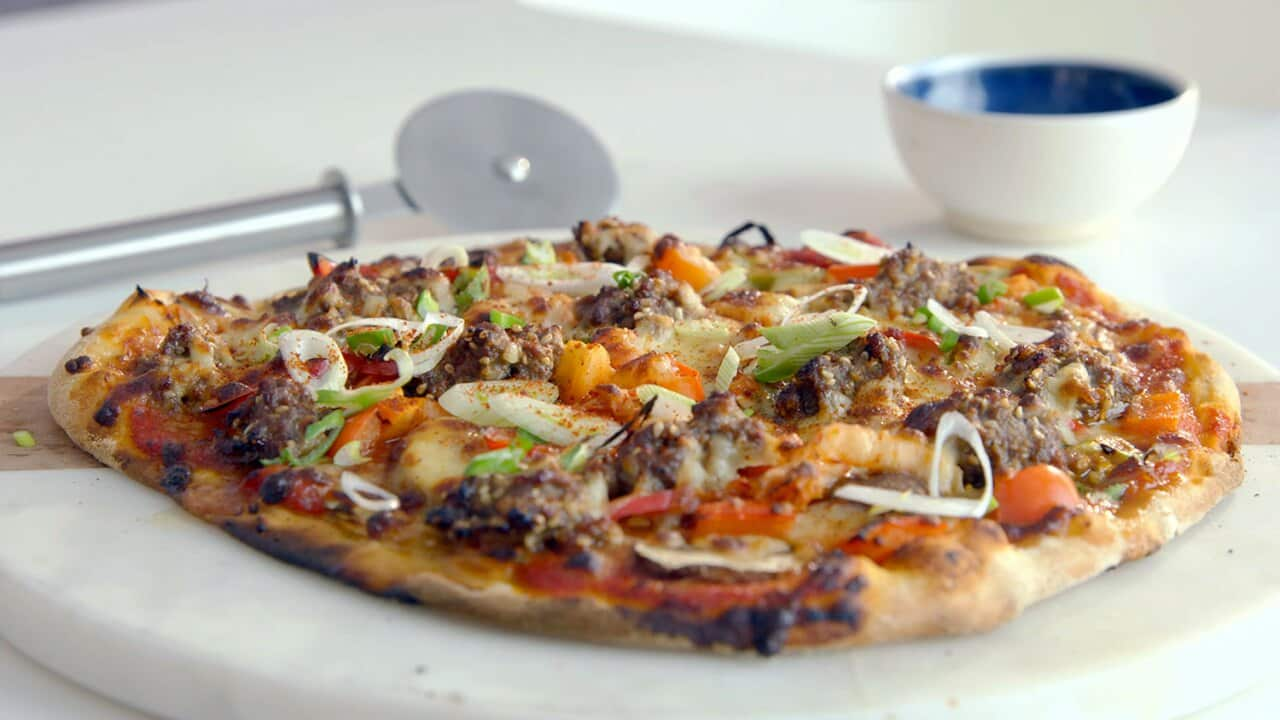--- airs weeknights on SBS Food from Monday April 19 at 7.00pm and 10.00pm, or stream it free on . ---
, , . Around the world, canny cooks have mastered the art of transforming different parts of the cow into delicious things, but in terms of a dish that celebrates the creature’s cooking potential, it’s hard to go past Vietnam’s best known soup noodle. “Pho is a fine example of nose to tail eating,” says Vietnamese-born Melbourne chef Jerry Mai, overseer of a burgeoning Melbourne restaurant empire that includes Annam, Bia Hoi and Pho Nom. “The marrow bones and oxtail that goes into the soup. The tripe. The tendon and the brisket. It’s a dish that doesn’t focus on any single primary or secondary cut.”
“Pho is a fine example of nose to tail eating,” says Vietnamese-born Melbourne chef Jerry Mai, overseer of a burgeoning Melbourne restaurant empire that includes Annam, Bia Hoi and Pho Nom. “The marrow bones and oxtail that goes into the soup. The tripe. The tendon and the brisket. It’s a dish that doesn’t focus on any single primary or secondary cut.”

Pho is a dish that doesn't focus on any single primary or secondary cut. Source: Griffin Simm
Beefy B-sides also feature prominently in the memories of Daniela Guevara, a former marine biologist born in Mexico City that now runs Port Adelaide’s bustling La Popular Tacqueria. She dreams of pancita, Mexico’s fortifying tripe soup that is ubiquitous around the capital. Of tostadas freighting pata de res, gelatinous cow’s feet. Of one day being able to serve guests lengua (tongue) and cabeza (steamed cow’s head) tacos. Till then, these Mexican cook-ups are limited to home with Guevara and her kitchen team keeping busy grilling rump over fast fires for carne asada and braising beef cheeks with a rich mole for the restaurant’s loyal clientele.
Having said that, Guevara encourages eager home cooks to give these dishes a go. But before you stumble too far down the beef recipe wormhole, it’s important to make sure you’ve found a reliable butcher who can get you access to some of the less commonly found cuts of beef as well as give you cooking advice.
“It’s nice chatting to your butcher and telling them what cut you need: it’s one of those most basic things that you have to do,” says Guevara. “My butcher is amazing and we work together lots which is important. If you go to a big butcher or supermarket, sometimes they can’t get you the cuts that you want.”
Once you’ve found your specialist butcher, the next stage is deciding how to cook your newfound beefy prizes. Here’s hoping this guide helps you fine-tune trusted recipes while inspiring you to cook (and shop) outside of your comfort zone. Rump
Rump

Thinly slice rump steak for Adam Liaw's beef with broccoli. Source: Steve Brown / Hachette
Cut from the back of a cow, rump (known as round in America) is a versatile, beefy and economical cut that can be cooked – and further broken down and divided – myriad ways. Brazilian barbecue cooks, for example, go straight for the rump cap (picanha) which features a flavoursome layer of fat that helps prevent meat from drying out during cooking. In Australia, rump steak is a firm pub meal favourite, although we’re not alone in our love of steak and chips. In Vietnam, rump steak is enjoyed as bò bít tết, a calorific combination of thinly sliced rump that’s grilled fast and served with fried potato, fried eggs, pate and a bread roll for mopping duties. Impressively, bò bít tết is often eaten at breakfast. Fillet
Fillet

Adam Liaw's beef tataki with onion and ponzu Source: Adam Liaw
The fillet is a long and lean muscle that sits near a cow’s spine and does little work, making it very tender. Factor in the fillet’s lack of fat and connective tissue and you’re looking at the perfect steak to pan-fry, serve raw as tartare, or – borrowing a little from both schools of thought – quickly sear all over and serve as the Japanese favourite, tataki. Also known as eye fillet, tenderloin and filet mignon in French.
Did you know a T-bone is a filet with a sirloin attached?

Teriyaki marinated T-bone

This beef bourguignon by Guillaume Brahimi is a great use for chuck. Source: Benito Martin
Cut from near the shoulder, the chuck is a well-used muscle that contains plenty of connective tissue, fat and meat. Like the rump, chuck can be broken down into a variety of different cuts, but it remains a reliable (and affordable) option for slow-cooked braises and curries such as rendang. Scotch
Scotch

Bone-in scotch fillet/ribeye is also known as a tommahawk steak. Source: It's Suppertime / VICELAND
One of the pin-up cuts of the beef world, scotch comes from a cow’s forequarter and is prized for its tenderness and flavour. The ideal cut for showing off a creature’s provenance, scotch excels when treated simply and cooked fast and hot on a grill or barbecue. Also known as the rib fillet, boneless rib-eye (when left on the bone, scotch fillet is often referred to as rib-eye) and entrecôte in French. Brisket
Brisket

Brisket is also the cut of beef used in a Reuben sandwich. Source: Brett Stevens
One of the larger cuts of beef, brisket comes from the underside chest area of a cow between its front legs. A layered cut featuring lots of fat and connective tissue, brisket requires a long cooking time and has recently found fame thanks to the rise of American barbecue cooking. (See Texas-style smoked brisket). In the Ashkenazic Jewish kitchen, brisket is braised and served at holidays such as Shabbat and Hannukah. In addition to being part of Jerry Mai’s pho soup base, brisket also features in Chinese cuisine where it is often stewed and served alongside noodles. Short ribs
Short ribs

Barbecued beef ribs (galbi) Source: Brett Stevens
Whereas beef spareribs are taken from the back of the animal – see scotch fillet above – beef short ribs come from the animal’s chest and are, yes, shorter than the spareribs. Big on flavour and tender, short ribs are best grilled or slowly roasted. While it’s possible to buy an entire plate of ribs, most short ribs are cut one of two ways. The English cut produces fat fingers of beef rib on the bone (popular among American-style barbecue). The flanken cut, meanwhile, is cut across the bone to produce strips of meat with small coins of bone in between. This cut is also known as LA galbi and is used prominently in Korean barbecue and throughout Asia. Skirt
Skirt

Peter Kuruvita's grilled skirt steak with chimichurri Source: Peter Kuruvita's Coastal Kitchen
A cut that has hit the big time in the last two decades, skirt is a lean, internal muscle found inside the abdomenal wall. Renowned for its deep beefiness rather than tenderness, skirt cooks fast over hot heat and shouldn’t be cooked more than medium-rare. In Mexico, where it is known as arrachera, it is marinated and grilled for deployment in fajitas while skirt steak, sliced into strips, is commonly used for stir-fries throughout Asia.













